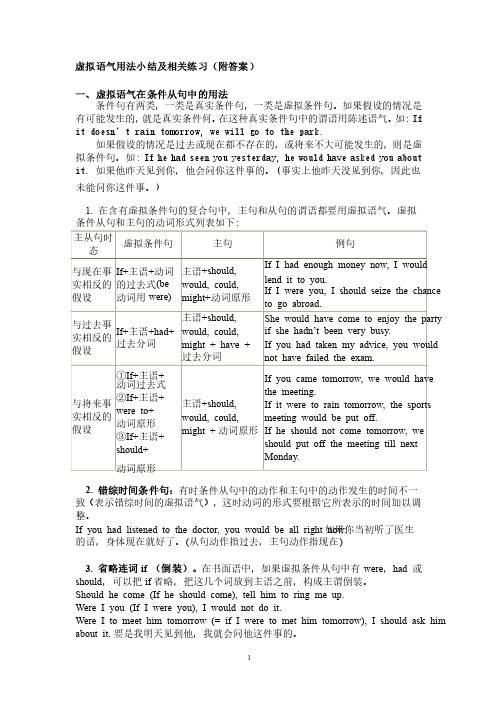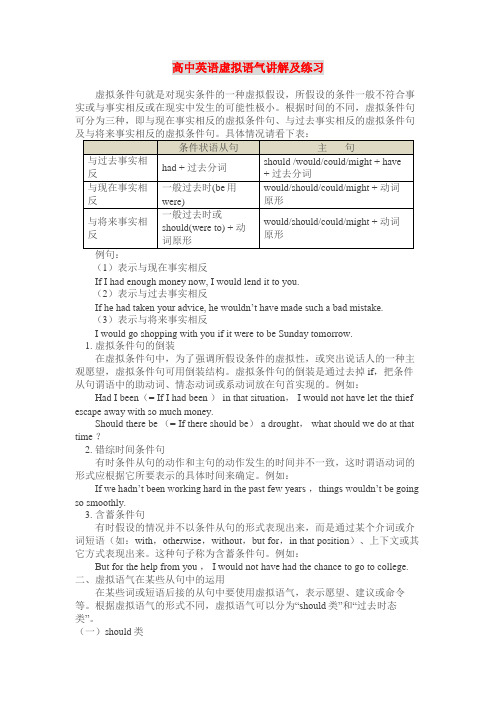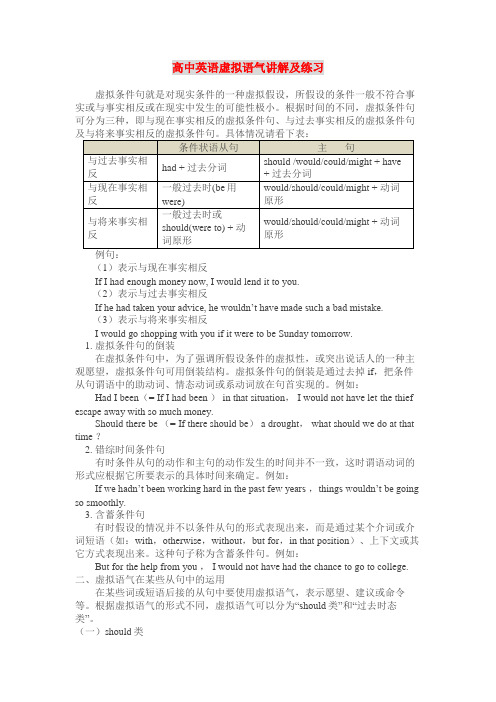虚拟语气用法小结及练习(附答案)
虚拟语气解析以及练习题答案详细解答

虚拟语气解析及练习与答案详解虚拟语气一、虚拟语气的运用练习题及答案解释The millions of calculations involved, had they been done by hand,______all practical value by the time they were finished.A.could loseB. would have lostC. might loseD. ought to have lost解析:这个句子中含有一个省略if,把助动词提前到主语they之前的虚拟条件句,该条件句表示对过去情况的假设,而主句中by the time they were finished表明主句也应该是对过去发生的情况的假设,因而应该选(B)would have lost为正确答案。
2. Had Paul received six more votes in the last election, he our chairman now.A. must have beenB. would have beenC. wereD. would be解析:这道题目是一个混合虚拟语气的句子。
条件句省略了if,把助词had提前到主语前面,表示对过去情况的假设,而主句中now表明了对现在情况的假设,所以应选would(should, could, might)+动词原形这种表达形式。
四个选项中只有(D)是正确表达形式,故为正确答案。
3. If you Jerry Brown until recently, you’d think the photograph on the right was strange.A. shouldn’t contactB. didn’t contactC. weren’t to contactD. hadn’t contacted解析:until recently,因此(D)是正确答案,而主句是隐含的对现在情况的假设,该句是一个混合虚拟条件句。
虚拟语气用法小结及练习(附答案)

虚拟语气用法小结及相关练习(附答案)一、虚拟语气在条件从句中的用法 条件句有两类,条件句有两类,一类是真实条件句,一类是真实条件句,一类是真实条件句,一类是虚拟条件句。
一类是虚拟条件句。
一类是虚拟条件句。
如果假设的情况是如果假设的情况是有可能发生的,就是真实条件何。
在这种真实条件句中的谓语用陈述语气。
如: If it doesn’t rain tomorrow, we will go to the park.如果假设的情况是过去或现在都不存在的,如果假设的情况是过去或现在都不存在的,或将来不大可能发生的,或将来不大可能发生的,则是虚拟条件句。
如拟条件句。
如: : If he had seen you yesterday, yesterday, he he would have asked you about it. it. 如果他昨天见到你,他会问你这件事的。
如果他昨天见到你,他会问你这件事的。
(事实上他昨天没见到你,因此也未能问你这件事。
未能问你这件事。
) )1. 在含有虚拟条件句的复合句中,主句和从句的谓语都要用虚拟语气。
虚拟条件从句和主句的动词形式列表如下: 主从句时态虚拟条件句虚拟条件句 主句主句 例句例句 与现在事与现在事 实相反的实相反的 假设假设 If+主语+动词动词 的过去式(be 动词用were) 主语+should, would, could, might+动词原形动词原形 If I had enough money now, I would lend it to you. If I were you, I should seize the chance to go abroad. 与过去事与过去事 实相反的实相反的 假设假设 If+主语+had+ 过去分词过去分词 主语+should, would, could, might + have + 过去分词过去分词 She would have come to enjoy the party if she hadn’t been very busy. If you had taken my advice, you would not have failed the exam. 与将来事与将来事 实相反的实相反的 假设假设 ①If+主语+ 动词过去式动词过去式②If+主语+ were to+ 动词原形动词原形 ③If+主语+ should+ 动词原形动词原形 主语+should, would, could, might + 动词原形动词原形 If you came tomorrow, we would have the meeting. If it were to rain tomorrow, the sports meeting would be put off. If he should not come tomorrow, we should put off the meeting till next Monday. 2. 错综时间条件句:有时条件从句中的动作和主句中的动作发生的时间不一致(表示错综时间的虚拟语气)(表示错综时间的虚拟语气),,这时动词的形式要根据它所表示的时间加以调整。
英语虚拟语气答题技巧及练习题(含答案)及解析

英语虚拟语气答题技巧及练习题(含答案)及解析一、初中英语虚拟语气1.---If I were you, I ________ study harderA.had B.would C.did D . do【答案】B【解析】试题分析:虚拟语气是一种特殊的动词形式,用来表示说话人所说的话并不是事实,而是一种假设、愿望、怀疑或推测。
判断是真实条件句还是非真实条件句。
只有在非真实条件句中才使用虚拟语气。
通过句子意思,看假设的条件是否能够实现,能够实现是真实条件句,不能使用虚拟语气;假设的条件不能实现则是非真实条件句,要用虚拟语气.判断这个假设是与哪个事实相反。
1、与现在事实相反若与现在事实相反,条件从句的谓语用过去式(be通常用were),主句谓语用“should (would, could, might)+动词原形”2、与过去事实相反若与过去事实相反,条件从句的谓语用过去完成时(had+过去分词),主句谓语用“should (would, could, might)+have+过去分词”3、与将来事实相反若与将来事实相反,条件从句的谓语用过去式(be通常用were),主句谓语用“should (would, could, might)+动词原形”:句意:如果我是你,我会学习更努力。
结合语境可知本句表示的是对现在的虚拟,故从句中用过去时态,主句中用过去将来时态。
选B。
考点:考查虚拟语气2.If I you, I the army.A.am, would join B.were, would join C.am, will join D.were, will join【答案】B【解析】试题分析:句意:如果我是你,我会参军.结合语境可知本句是对客观状况的虚拟,故用过去时态,主句用过去将来时态.选B.考点:if引导的条件状语从句点评:虚拟语气是一种特殊的动词形式,用来表示说话人所说的话并不是事实,而是一种假设、愿望、怀疑或推测。
英语语法专项:虚拟语气用法详解及练习(附答案)

高中英语虚拟语气讲解及练习虚拟条件句就是对现实条件的一种虚拟假设,所假设的条件一般不符合事实或与事实相反或在现实中发生的可能性极小。
根据时间的不同,虚拟条件句可分为三种,即与现在事实相反的虚拟条件句、与过去事实相反的虚拟条件句(1)表示与现在事实相反If I had enough money now, I would lend it to you.(2)表示与过去事实相反If he had taken your advice, he wouldn’t have made such a bad mistake.(3)表示与将来事实相反I would go shopping with you if it were to be Sunday tomorrow.1. 虚拟条件句的倒装在虚拟条件句中,为了强调所假设条件的虚拟性,或突出说话人的一种主观愿望,虚拟条件句可用倒装结构。
虚拟条件句的倒装是通过去掉if,把条件从句谓语中的助动词、情态动词或系动词放在句首实现的。
例如:Had I been(= If I had been ) in that situation, I would not have let the thief escape away with so much money.Should there be (= If there should be) a drought, what should we do at that time ?2. 错综时间条件句有时条件从句的动作和主句的动作发生的时间并不一致,这时谓语动词的形式应根据它所要表示的具体时间来确定。
例如:If we hadn’t been working hard in the past few years ,thing s wouldn’t be going so smoothly.3. 含蓄条件句有时假设的情况并不以条件从句的形式表现出来,而是通过某个介词或介词短语(如:with,otherwise,without,but for,in that position)、上下文或其它方式表现出来。
虚拟语气总结附练习及答案

虚拟语气简介虚拟语气用来表示说话人的主观愿望或假想,而不表示客观存在的事实,所说的是一个条件,不一定是事实,或与事实相反。
虚拟语气通过谓语动词的特殊形式来表示。
英语中的语气分为陈述语气、祈使语气、虚拟语气三类。
在表示虚假的、与事实相反的或难以实现的情况时用虚拟语气,表示主观愿望或某种强烈情感时,也用虚拟语气。
即当一个人说话时欲强调其所说的话是基于自己的主观想法,愿望,假想,猜测,怀疑或建议,而不是根据客观实际,就用虚拟语气。
①错综时间条件句:当条件状语从句表示的行为和主句表示的行为所发生的时间不一致时,被称为错综时间条件句,动词的形式要根据它表示的时间作出相应的调整。
如:If you had followed my advice just now, you would be better now.If you had studied hard before, you would be a college student now.②if省略句在条件句中可以省略if, 把were, had, should提到句首,变成倒装句式。
如:If I were at school again, I would study harder.→Were I at school again, I would study harder.如果我还有上学的机会,我会更加努力学习。
If you had come earlier, you would catch the bus.→Had you come earlier, you would catch the bus.如果你来得早点,你就能赶上公共汽车。
If it should rain tomorrow, we would not go climbing.→Should it rain tomorrow, we would not go climbing.如果明天下雨的话,我们就不能登山去了。
虚拟语气讲解和练习(附答案)

高中英语虚拟语气讲解及练习虚拟条件句就是对现实条件的一种虚拟假设,所假设的条件一般不符合事实或与事实相反或在现实中发生的可能性极小。
根据时间的不同,虚拟条件句可分为三种,即与现在事实相反的虚拟条件句、与过去事实相反的虚拟条件句(1)表示与现在事实相反If I had enough money now, I would lend it to you.(2)表示与过去事实相反If he had taken your advice, he wouldn’t have made such a bad mistake.(3)表示与将来事实相反I would go shopping with you if it were to be Sunday tomorrow.1. 虚拟条件句的倒装在虚拟条件句中,为了强调所假设条件的虚拟性,或突出说话人的一种主观愿望,虚拟条件句可用倒装结构。
虚拟条件句的倒装是通过去掉if,把条件从句谓语中的助动词、情态动词或系动词放在句首实现的。
例如:Had I been(= If I had been ) in that situation, I would not have let the thief escape away with so much money.Should there be (= If there should be) a drought, what should we do at that time ?2. 错综时间条件句有时条件从句的动作和主句的动作发生的时间并不一致,这时谓语动词的形式应根据它所要表示的具体时间来确定。
例如:If we hadn’t been working hard in the past few years ,thing s wouldn’t be going so smoothly.3. 含蓄条件句有时假设的情况并不以条件从句的形式表现出来,而是通过某个介词或介词短语(如:with,otherwise,without,but for,in that position)、上下文或其它方式表现出来。
虚拟语气讲解和练习(附答案)

高中英语虚拟语气讲解及练习虚拟条件句就是对现实条件的一种虚拟假设,所假设的条件一般不符合事实或与事实相反或在现实中发生的可能性极小。
根据时间的不同,虚拟条件句可分为三种,即与现在事实相反的虚拟条件句、与过去事实相反的虚拟条件句(1)表示与现在事实相反If I had enough money now, I would lend it to you.(2)表示与过去事实相反If he had taken your advice, he wouldn’t have made such a bad mistake.(3)表示与将来事实相反I would go shopping with you if it were to be Sunday tomorrow.1. 虚拟条件句的倒装在虚拟条件句中,为了强调所假设条件的虚拟性,或突出说话人的一种主观愿望,虚拟条件句可用倒装结构。
虚拟条件句的倒装是通过去掉if,把条件从句谓语中的助动词、情态动词或系动词放在句首实现的。
例如:Had I been(= If I had been ) in that situation, I would not have let the thief escape away with so much money.Should there be (= If there should be) a drought, what should we do at that time ?2. 错综时间条件句有时条件从句的动作和主句的动作发生的时间并不一致,这时谓语动词的形式应根据它所要表示的具体时间来确定。
例如:If we hadn’t been working hard in the past few years ,thing s wouldn’t be going so smoothly.3. 含蓄条件句有时假设的情况并不以条件从句的形式表现出来,而是通过某个介词或介词短语(如:with,otherwise,without,but for,in that position)、上下文或其它方式表现出来。
英语语法专项:虚拟语气用法详解及练习(附答案)

高中英语虚拟语气讲解及练习虚拟条件句就是对现实条件的一种虚拟假设,所假设的条件一般不符合事实或与事实相反或在现实中发生的可能性极小。
根据时间的不同,虚拟条件句可分为三种,即与现在事实相反的虚拟条件句、与过去事实相反的虚拟条件句(1)表示与现在事实相反If I had enough money now, I would lend it to you.(2)表示与过去事实相反If he had taken your advice, he wouldn’t have made such a bad mistake.(3)表示与将来事实相反I would go shopping with you if it were to be Sunday tomorrow.1. 虚拟条件句的倒装在虚拟条件句中,为了强调所假设条件的虚拟性,或突出说话人的一种主观愿望,虚拟条件句可用倒装结构。
虚拟条件句的倒装是通过去掉if,把条件从句谓语中的助动词、情态动词或系动词放在句首实现的。
例如:Had I been(= If I had been ) in that situation, I would not have let the thief escape away with so much money.Should there be (= If there should be) a drought, what should we do at that time ?2. 错综时间条件句有时条件从句的动作和主句的动作发生的时间并不一致,这时谓语动词的形式应根据它所要表示的具体时间来确定。
例如:If we hadn’t been working hard in the past few years ,thing s wouldn’t be going so smoothly.3. 含蓄条件句有时假设的情况并不以条件从句的形式表现出来,而是通过某个介词或介词短语(如:with,otherwise,without,but for,in that position)、上下文或其它方式表现出来。
- 1、下载文档前请自行甄别文档内容的完整性,平台不提供额外的编辑、内容补充、找答案等附加服务。
- 2、"仅部分预览"的文档,不可在线预览部分如存在完整性等问题,可反馈申请退款(可完整预览的文档不适用该条件!)。
- 3、如文档侵犯您的权益,请联系客服反馈,我们会尽快为您处理(人工客服工作时间:9:00-18:30)。
虚拟语气用法小结及相关练习(附答案)一、虚拟语气在条件从句中的用法条件句有两类,一类是真实条件句,一类是虚拟条件句。
如果假设的情况是有可能发生的,就是真实条件何。
在这种真实条件句中的谓语用陈述语气。
如: If it doesn’t rain tomorrow, we will go to the park.如果假设的情况是过去或现在都不存在的,或将来不大可能发生的,则是虚拟条件句。
如: If he had seen you yesterday, he would have asked you about it. 如果他昨天见到你,他会问你这件事的。
(事实上他昨天没见到你,因此也未能问你这件事。
)1. 在含有虚拟条件句的复合句中,主句和从句的谓语都要用虚拟语气。
虚拟2. 错综时间条件句:有时条件从句中的动作和主句中的动作发生的时间不一致(表示错综时间的虚拟语气),这时动词的形式要根据它所表示的时间加以调整。
If you had listened to the doctor, you would be all right now. 如果你当初听了医生的话,身体现在就好了。
(从句动作指过去,主句动作指现在)3. 省略连词if (倒装)。
在书面语中,如果虚拟条件从句中有were,had 或should,可以把if省略,把这几个词放到主语之前,构成主谓倒装。
Should he come (If he should come), tell him to ring me up.Were I you (If I were you), I would not do it.Were I to meet him tomorrow (= if I were to met him tomorrow), I should ask him about it. 要是我明天见到他,我就会问他这件事的。
Had I had the money last year (= if I had had the money last year), i would have bought the house. 如果我去年有了这笔钱,我就买那所房子了。
Should there be any trouble with the boiler, the automatic controlling unit would cut off the fuel oil supply. 假如锅炉出问题的话,自控装置会自动切断燃油的供给。
4. 含蓄条件句:句中没有明显的虚拟条件句,而是利用某他手段或方式来暗示存在虚拟条件。
其虚拟的结构形式通过主句来表现。
常用来表示含蓄虚拟条件的方式有:(1)介词或介词短语(代替状语从句):but for(要不是…),without(假若没有…),with(假若有…)With your help, I could have finished the work ahead of time. 如果有你的帮助的话,我本可以提前完成这项工作。
Without air and water, there would be no living things on the earth. 如果没有空气和水,地球上就不会存在生物。
But for the rain, we should have had a pleasant journey. 如果不是因为下雨,旅途会很愉快。
(2)用or,otherwise(否则),but等类似转折词We didn’t know his telephone number; otherwise we would have telephoned him.I would have come to help you ,but I was busy that day.I was ill that day. Otherwise, I would have taken part in the sports meeting.(3)根据上下文语境来表示某种假设情况Five minutes earlier and you could have met her at the station. 早来五分钟的话,你就能在车站见到他了。
You could have done better,but you didn’t try your best.二、(Should) + 动词原形类1. 在suggest,demand,order,propose,insist,command,request,desire, recommend等动词后的宾语从句中,谓语动词用“should + 动词原形”,表示建议、要求、命令等。
如: I demand that he (should) answer me immediately.注意:当suggest表示暗示、表明时,不用虚拟语气,用陈述语气。
如:The smile on her face suggested that she was satisfied with our work.当insist表示“坚持认为,坚持说”之意时, 不用虚拟语气,用陈述语气. 表示“坚持要求,坚持主张”用虚拟语气。
如:The man insisted that he had never stolen the money.我们可以用“一二三四”法巧记这些动词:“一、二、三、四”法,即一个坚持(insist),两个命令(order,command),三个建议(suggest, propose, advise), 四个要求(demand, require, request, ask)。
2. advice, idea, order, plan, demand, proposal, suggestion, request等名词之后的表语从句和同位语从句中.如:My suggestion is that we (should) hold a meeting this evening.My proposal is that we(should)set a deadline for handing in the plan.The general sent the order that the battle(should)be held on until the complete failure of the enemy.3. 在It is / was suggested (desired, ordered, demanded, required, requested, proposed, etc.) that…It’s requested that we (should)keep the stability of the society for the people’s peaceful life.4. 虚拟语气在主语从句中的用法:在“It 十be 十adj/n 十that…” 这类句型里,that所引导的主语从句中的谓语动词常用“should十动词原形”结构,It is necessary that the badly wounded man(should)be treated immediately.It is (was) important (necessary, natural, strange, etc.) that…It is (was) a pity (a shame, no wonder, etc.) that …此类的形容词或名词三种:①形容某件应该做的事是“必需的”、“重要的”、“适当的”、“自然的”、“紧迫的”等。
如:important,necessary,unnecessary,strange,natural,possible,impossible,fortunate,advisable,desirable,essential。
②形容某件居然发生的事令人“惊讶的”“失望的”“可怕的”“好笑的”等。
如:surprising,amazing,pleasing,dreadful,funny③表明某事是一种遗憾。
如:a pity,a shame,no wanderIt’s strange that he (should) have acted toward his parents like that.(竟然会)It’s surprising/amazing/pl easing/that she (should) win over her mother.(居然会)It’s strange that he (should) leave without telling us. (竟然会)It’s natural that she (should)make such a mistake.(不以为然的语气,“会”)It’s a pity/a shame/no wonder that our team (should) lose the game.(遗憾或不以为然的语气,竟“会”)三、虚拟语气的其他用法1. wish的用法与现在事实相反, 用were或动词的一般过去式;与过去事实相反, 用had+过去分词;表示将来没有把握或不太可能实现的愿望,用would/could/might+动词原形,后的从句不能用should.如:I wish she were here. I wish you would go with us tomorrow.I wish she had taken my advice.2. It is (high) time that后面的从句谓语动词要用过去式或用should加动词原形,但should不可省略。
It is time that the children went / should go to bed.3. 用在would rather, had rather后的宾从中谓语动词应用过去时或过去完成时。
I would rather you were not here.I’d rather you had been present.4. 在带有even if / even though引导的让步状语从句的主从复合句中,主句和从句都用虚拟语气,动词形式与含有非真实条件句的虚拟语气相同。
如:Even if he had been ill, he would have gone to his office. 即使生了病,他俩去办公室。
5. 由as if或as though引导的状语从句表示比较或方式时。
